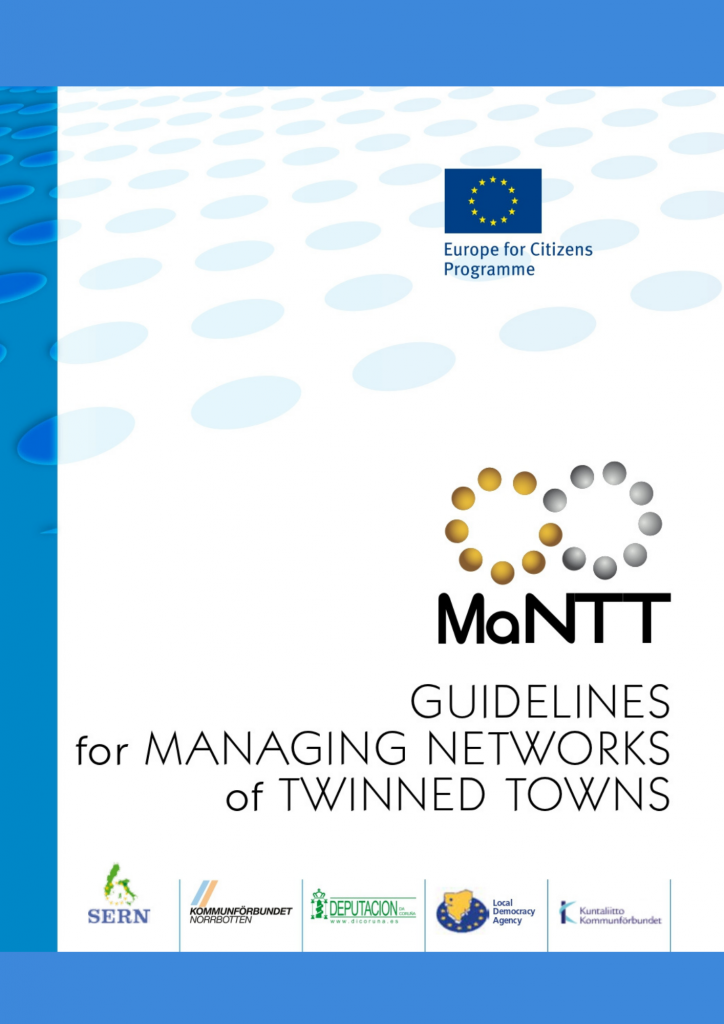

Europe For Citizens

Mantt was a European project financed by the Europe for Citizens programme under the action 2.2 Supporting Measures. The general aim of the project was to improve the management skills of civil servants and strengthen political commitment in support of networks of twinned towns (NTT) projects.
Three training seminars were organized to achieve this goal, two of which were directed at public officers and one at political representatives. The fundamental assumption behind the process was that management training is based on the capacity to socialize and theorize the practice. Thus, the seminars were geared towards highlighting and discussing the “critical moments” of the Project Cycle Management (PCM), as experienced by the same participants and/or by other colleagues similarly involved in NTT projects.
The training process was developed starting with a questionnaire on the “critical moments” of project management, this questionnaire served to value, prioritize and motivate the relevance of each moment according to the personal experience of public officers and managers involved in different NTT projects and at different stages of the project cycle.The feedback from the questionnaires provided the basis for the training seminars, as their contents and the discussion derived directly from it.
The training seminars targeting public officers were developed according to a methodological sequence aiming to: socialize the indications coming from the questionnaires; acknowledge/adopt the PCM approach to interpreting problems (and priorities) according to a common “grammar” of what each phase of the project cycle entails; deepen and discuss the different issues through work groups and plenary sessions in order to formulate common guidelines and orientation.
The specific objectives of Mantt derived from the problems emerged in the partners’ previous experiences in the planning of Networks of Twinned Towns, that is to say: a need of improving skills and abilities related to, role management in the project cycle; a stronger and consistent commitment of the political representatives required in the partner organisations during the implementation phase of thematic networks; a stronger capacity to capitalize on the results and the need to valorise the outcomes of networks of twinned towns for other municipalities interested in revitalizing their town twinning or getting engaged in transnational cooperation. Therefore, the specific objectives of the project were:
Coordination meeting
9/10 January 2011
Bologna (IT)
First transnational seminar
1/3 Mars 2011
La Coruña (ES)
Seminar for political representatives
13/15 April 2011
Bertinoro (IT)
Second training seminar
14/16 June 2011
Luleå (SE)
Evaluation and follow-up meeting
13/15 September 2011
Verteneglio (HR)
The objectives were reached through a learning process which has highlighted both the importance of creating a strong political commitment and of improving and monitoring the activities and the project possibilities thanks to active and well trained civil servants and managers. The results of the discussion and working groups activities have been summed up and analysed in the final publication where guidelines for managing networks of twinned towns have been explained.
The three training seminars organized to achieve the goals of the project, two of which were directed at public officers and one at political representatives involved 6 countries, 34 municipalities and a total of 81 participants. It is possible to identify the impact of Mantt the two different target groups: political representatives and civil servants:
Political representatives: thanks to the guided discussion group, it was possible to highlight some elements which raised awareness about the importance of NTTs among politicians:
Civil servants: Acquiring new knowledge on the management of NTT projects, the civil servants can produce a strong and active impact at local level:


Our objective is to increase cooperation among the
members of the network, between Italy and Sweden
and, more in general, the North and South of
the European Union.
Stradone Martiri della Libertà, 15 – 43123 Parma (PR) – Italy | C.F.: 91251370374
Tel: +393483892600 – Website: www.sern.eu – Email: secretariat@sern.eu – PEC: secretariat@pec.sern.eu
© 2024 | All rights reserved | Privacy Policy | Cookie Policy